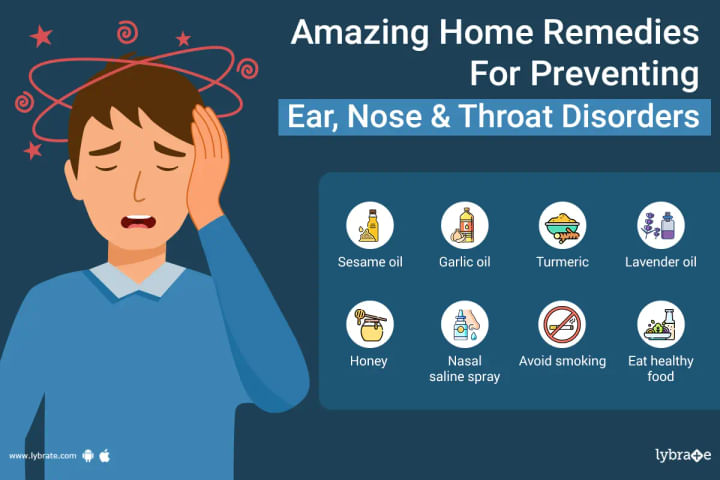Preventing Ear, Nose, and Throat Disorders
What is Ear, Nose, and Throat Disorders?
Ear, Nose, and Throat (ENT) Disorders are a group of conditions that affect the areas of the head and neck. Examples of common ENT disorders include chronic sinusitis, ear infections, dizziness, allergies, hearing loss, hoarseness or voice problems, neck masses, throat infection or pain and tonsil swelling.
Many of these conditions can cause significant discomfort and impair your quality of life. Treatment can sometimes involve medication or even surgery to open blocked airways or remove abnormal growths.
In addition to treatment provided by a doctor or an otolaryngologist (ear-nose-throat specialist), you may benefit from alternative treatments such as massage therapy and lifestyle changes.
What are the signs and symptoms of Ear, Nose, and Throat Disorders?
Common signs and symptoms related to ENT disorders include:
- Hearing loss or diminished hearing.
- Ear pain or discomfort.
- Ringing in the ears (tinnitus).
- Discharge from the ear.
- Vertigo, dizziness, imbalance or spinning sensation.
- Nasal congestion or blockage.
- Sinus pressure and pain.
- Post-nasal drip or drainage from the nose or down the throat.
- Sore throat (pharyngitis)
- Hoarseness or changes in voice quality.
- Tonsillitis
- Swelling in the neck.
- Difficulty breathing through the nose.
- Unexplained cough.
What are possible complications of Ear, Nose, and Throat Disorders?
Ear, Nose, and Throat (ENT) disorders can have a variety of complications that can range from mild to severe. Some of the more common complications include:
- Perforation of the eardrum: Damage to the eardrum that can cause hearing loss, balance issues, and infection.
- Sinus infections and/or nasal congestion: Sinus infections occur when bacteria or viruses enter your sinuses and cause inflammation; nasal congestion is caused by inflamed tissues blocking nasal passages.
- Meniere's Disease: An inner ear disorder that causes dizziness, tinnitus, vertigo, hearing loss and a sense of fullness in the ear.
- Vocal Cord Paralysis: Damage to the nerves controlling the vocal cords which damages voice control and may lead to difficulty speaking or breathing problems.
- Vertigo: A feeling of spinning or whirling motion when either standing still or moving; can cause nausea, sweating, vomiting and difficulty concentrating.
Remedies and Tips for Preventing Ear, Nose, and Throat Disorders
- Lavender oil: Apply a few drops of warm lavender oil in the ear to reduce inflammation and relieve pain from ear infections.
- Garlic oil: It has anti-inflammatory properties that can help treat various ear, nose and throat problems like common colds and allergies. Garlic oil can also be applied directly on to the affected area for quick relief from irritation and discomfort.
- Sesame Oil: It may help provide relief from nasal congestion caused by allergies or a common cold due to its antibacterial properties. It may also help reduce snoring by soothing the passageways in the throat that are often blocked in cases of sleep apnea.
- Turmeric: Turmeric can be added to food or consumed raw as it helps break down mucous buildup in the throat which could cause discomfort when swallowing or talking. It also helps regulate temperatures with its anti-inflammatory properties, which could be beneficial for people suffering from sinusitis or rhinitis. Additionally, turmeric contains antifungal and antiviral elements which makes it an excellent remedy for head colds as well as any infection related to the ears, nose and throat such as tonsillitis or laryngitis.
- Honey: Honey is an effective Ayurvedic remedy for many ear, nose and throat ailments due to its antibacterial properties that can help fight off bacteria causing infections like strep throat. Additionally honey coats the throat walls providing instant relief from soreness while kicking off a healing process due to active enzymes present in honey.
- Keep your ears and nose clean: It’s a good idea to clean your ears and nose daily using a warm washcloth or cotton swab. This helps to keep debris, dust, and other irritants from entering your ears and nose, which can lead to infection or inflammation.
- Humidify the air in your home: Dry air can contribute to dryness and irritation of the ear, nose, and throat membranes. Adding a humidifier to your bedroom or other areas of the house can help promote comfortable breathing and reduce symptoms such as congestion.
- Use nasal saline spray: Spraying nasal saline spray into each nostril prior to bedtime helps keep nasal passages moist throughout the night and makes it easier for mucus to move more freely from one nostril to another which reduces congestion.
- Avoid smoking: Exposure to secondhand smoke can be especially damaging for ear, nose,and throat disorders so it's best for everyone in the household if you quit smoking entirely or avoid being exposed in areas where smoking is allowed.
- Eat healthy foods: Eating fresh fruits, vegetables, lean proteins, whole grains should all be part of an overall healthy eating plan that also helps protect against ear nose and throat problems including infections of both external structures like sinuses as well as inner structures like tonsils or adenoids.
If the measures indicated above fail, you may have to resort to medical or surgical treatments.
What are the surgical treatments for Ear, Nose, and Throat Disorders?
Surgery is often considered a last resort to treat ENT disorders, only after other treatments have been explored. Common surgeries used to address Ear, Nose, and Throat Disorders are:
- Septoplasty: Surgery to correct a deviated septum and improve airflow through the nose.
- Tonsillectomy: Removal of the tonsils through a surgical procedure.
- Endoscopic Sinus Surgery: Endoscopic surgery of the sinuses for a more thorough treatment of sinusitis or to remove polyps from the nose and sinuses.
- Tympanoplasty: Surgery to repair any damage done to the eardrum in cases of chronic ear infections.
- Myringotomy: Surgical procedure sometimes used for people with chronic ear infections or fluid buildup behind the eardrum in which a small incision is made in the eardrum and fluid is drained from behind it.
Best doctors to consult for Ear, Nose, and Throat Disorders?
Ear, Nose, and Throat Disorders can be treated by a number of specialists, primarily Otolaryngologists, who treat the head and neck.
- Otolaryngologists: These doctors are equipped to diagnose and treat disorders of the ear, nose, throat and mouth region. They can provide evaluations in devices such as hearing aids and endoscopy to examine various parts of the throat.
- Speech therapists or allergists: Other types of specialists could include speech therapists or allergists who specialize in treating sinusitis or allergies.
Depending on your individual needs it is best to consult with a doctor before deciding what is best for you.



+1.svg)
